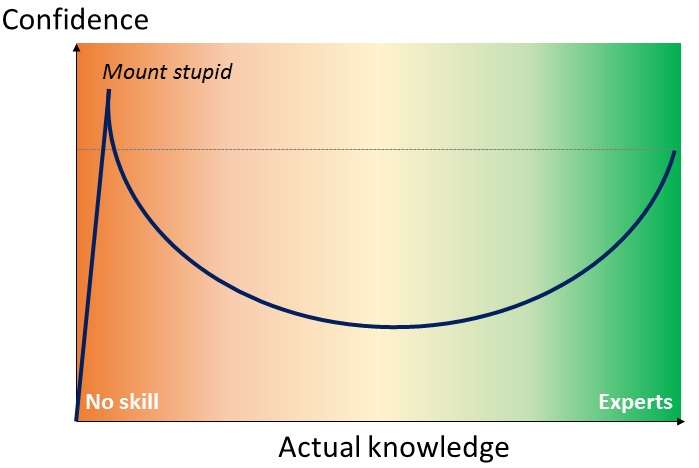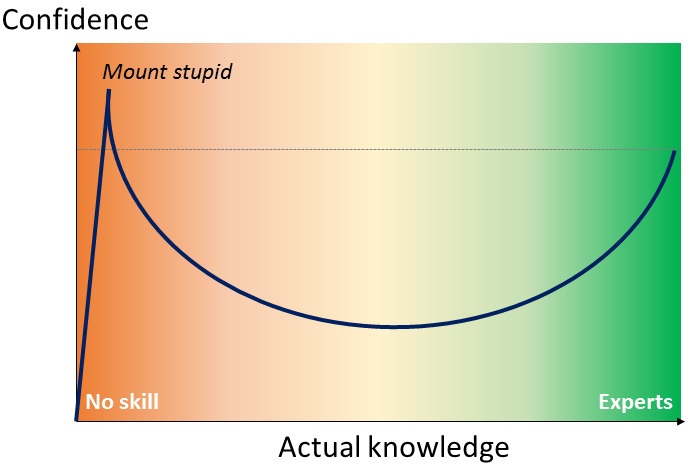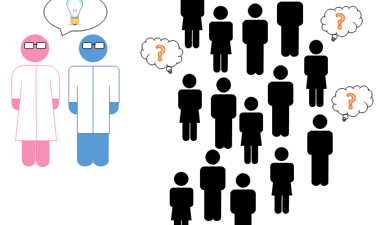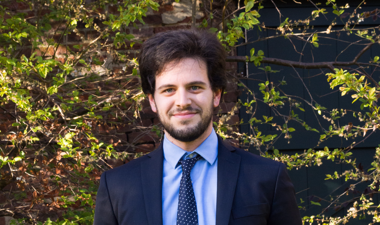On self awareness, the Dunning-Kruger effect, and why I might be less stupid than I think.

On self awareness, the Dunning-Kruger effect, and why I might be less stupid than I think.
Being satisfied with one's work is extremely important for many reasons. Unfortunately, assessing your own performance might not be so easy. Maybe, this can help improve your overall satisfaction.
As many of you know, people involved in MSCA projects (like FiBreMoD researchers) meet regularly to update their status and activities. In those consortium meetings, the main discussed topics are related to the technical content the PhD students’ research: objectives are defined and updated, activities are planned and, most importantly, results are shown. As our most affectionate followers might know, there are 13 PhD students in FiBreMoD: this means that I listen to the work of 12 fellow researchers. Each time I do, I can’t help but think that, compared to theirs, my work is way too simple, easy (almost trivial) and somehow, even sloppy. Looking at their presentations, I have always seen the intrinsic complexity behind their research, complexity I felt was absent in my own work. However, before the last event (I am actually writing this blog on the plane that is taking me back from our third consortium meeting) I was determined to at least understand the causes of this sensation. And finally I got it. The problem is that I am actually really, really bad. Correction: the probability is high that, you reader, are bad as well. Another correction: I am not (and you probably aren’t either) bad at my job, but I am really, really bad, at evaluating my level of competence. I apologise, my dear reader, if I have involved you in this critic, but the so called Dunning-Kruger effect is likely to apply to all human beings.
The Dunning-Kruger effect is a cognitive bias affecting our self-awareness. To make a long story short, one’s self-confidence in a certain topic is related to its actual relative knowledge, but not in the most logical way: you can look at the graph below. Incompetent people tend to overestimate their abilities, to a limit where they appear arrogant; on the opposite side, experts are likely to give for granted their knowledge, thinking that everybody is equally capable of the tasks they deal with daily. People between those extremes still lack the actual understanding to be a master, but have enough knowledge to see how hard is the path to expertise is. You can find more details on the TED video I discovered, linked at the end.

David Dunning, one of the two scientists involved in the study, when asked on what is the single characteristic making a person subjected to this self-deceit, he answered “breathing”. Since I thus suffer from it, I asked myself, where am I, in that curve? I understood that I can hardly give a definitive answer, but here are some bits of thought that hit me. First of all, I am inclined to think that pursuing a PhD is that path to knowledge characterising the middle section (likely to continue also with a post-doc, maybe even more). This is also easy to contextualise: turning a metaphoric head to right, I can see all my supervisors comfortably sitting on the experts side. On the left, family and friends think they have brilliant solutions for your problems (luckily, this is not common in engineering as it might be, for example, in medicine), while university students slowly realise in how many troubles they are getting themselves into. But what about the comparison with my colleagues? Can this explain my inadequacy feeling at FiBreMoD’s meeting? Probably yes. After all, it is a common misjudgement: things we deal with on a daily basis and that we understand appear easy. Here is my work self-considered as easy and immediately accessible to all the people listening to my presentations. Things we see occasionally, and that we try to grasp without the proper background look quite complex. Here are my colleagues’ presentations, so complicated and hard to understand, as their work surely is.
Not being a social psychology scientist myself, I am probably in the very beginning of the relative Dunning-Kruger curve, so chances are you read a bunch of non-sense. However, I found its discovery very interesting and worth telling. Maybe there are other PhD students who are now getting frustrated more than me for the same inadequacy feeling, and this might help. So next time you are thinking if you are good enough, have no doubts: you aren’t. At evaluating yourself.
TED video on the topic: https://www.youtube.com/watch?v=pOLmD_WVY-E
Dunning and Kruger published their research in a paper called: “Unskilled and unaware of it: how difficulties in recognizing one's own incompetence lead to inflated self-assessments”: http://dx.doi.org/10.1037/0022-3514.77.6.1121


